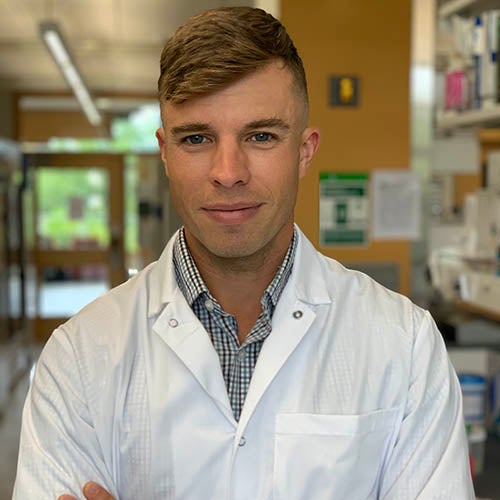Joe Schrader, research assistant professor of biomedical and pharmaceutical sciences, uses mass spectroscopy proteomics to investigate biomarkers and disease mechanisms in Alzheimer’s disease and related disorders. He shares his thoughts on research, how being a musician makes him a better scientist, and why he hasn’t missed a day of running in seven years.

What drew you to this area of research?
My Ph.D. was in pharmaceutical science with a focus on dopamine receptors in schizophrenia, but the NIH stopped funding projects looking at dopamine in schizophrenia. I needed to reinvent myself as a researcher. I was lecturing part-time in the College of Pharmacy, and Judianne [Davis, manager of the Van Nostrand lab] worked across the hall from my office. One day, she introduced herself and said, “We need a postdoc in our lab.” I was interested in their work with Alzheimer’s and related disorders, and in deciphering underlying mechanisms of pathology and discovering new targets and markers for disease treatment. It was a great fit.
What did you enjoy about moving into a new area of research?
I like learning new things, and I had to learn a completely different set of skills and techniques. I really like the fact that global proteomics generates so many hypotheses; you are never out of ideas for exciting projects. The work has been rewarding and interesting. Plus, Bill [Van Nostrand, co-director of the Ryan Institute] is a great mentor. I’ve learned so much from him, not only in terms of grants and publishing, but also about persistence. We’re both endurance athletes—he does Iron Man, and I run marathons.
When did you get into running?
I was a cross-country captain in high school, but then I gave it up in college. During my last year of grad school, I started running again as a way to get back in shape and manage stress. I told myself I would run 10 days in a row, then take a break, but I woke up on day 11, and thought, “I’ll run today too.” So I decided to run for 50 days. Then 100, 150, 200. Every time I told myself I would take a break, I decided instead to keep the streak going. I haven’t missed a day of running in seven years.
How do you cultivate self-discipline?
I grew up playing sports. When you have coaches, they force you to train or practice. Eventually in life, you have to be able to do that for yourself. In science, you need to have a reason why you’re doing this work. I’ve had family members who have suffered with schizophrenia and Alzheimer’s disease, and I’ve seen the pain it causes. You need a deep motivation that’s emotional and personal because those are the forces strong enough to keep you pushing forward.
Did you always want to be a scientist?
I started out [at URI] as a major in engineering. I’m a musician, and I had this idea I would build all my own amplifiers and electric guitars, like [astrophysicist and Queen lead guitarist] Brian May. Then I realized I hated physics. URI was starting up the B.S. in pharmaceutical sciences program at the time. I was the first student enrolled.
Do you still play music?
I sing, and I play mainly acoustic and electric guitar, or piano. I also taught myself bass, drums, ukele, clarinet, harmonica, trombone. Whenever I was a bored as a kid, I taught myself a new instrument. I like figuring out the mechanisms of how an instrument works.
What similarities do you see between music and science?
When you learn a new instrument, you have to persevere through a very slow and shallow learning curve. It takes a lot of time, and people can get frustrated quickly and give up. Science is also one of those things where you are going to hit a lot of road blocks, but you have to endure the frustration and keep coming back with the same motivation and tenacity every day, no matter how many times you fail. On a more technical side, there are physical skills you gain from playing instruments that give you “good hands” in the lab. If you’re doing bench work, it requires dexterity and coordination.
What do you find most fascinating about the work you are doing now?
The brain is the final frontier. The more we know about it, the less we know. The complexity is awe-striking. There are times when you think, “How are we ever going to be able to figure this out?” That’s what makes it fascinating. You’re uncovering things no one has ever seen before.
___________
Joseph Schrader, Ph.D. is a research assistant professor of biomedical and pharmaceutical sciences. After earning his Ph.D. in pharmacology and toxicology at URI, he spent a year as a visiting assistant professor in cell biology at Salve Regina University. He has regularly lectured at the URI College of Pharmacy and serves as a mentor in the B.S.P.S. program.
